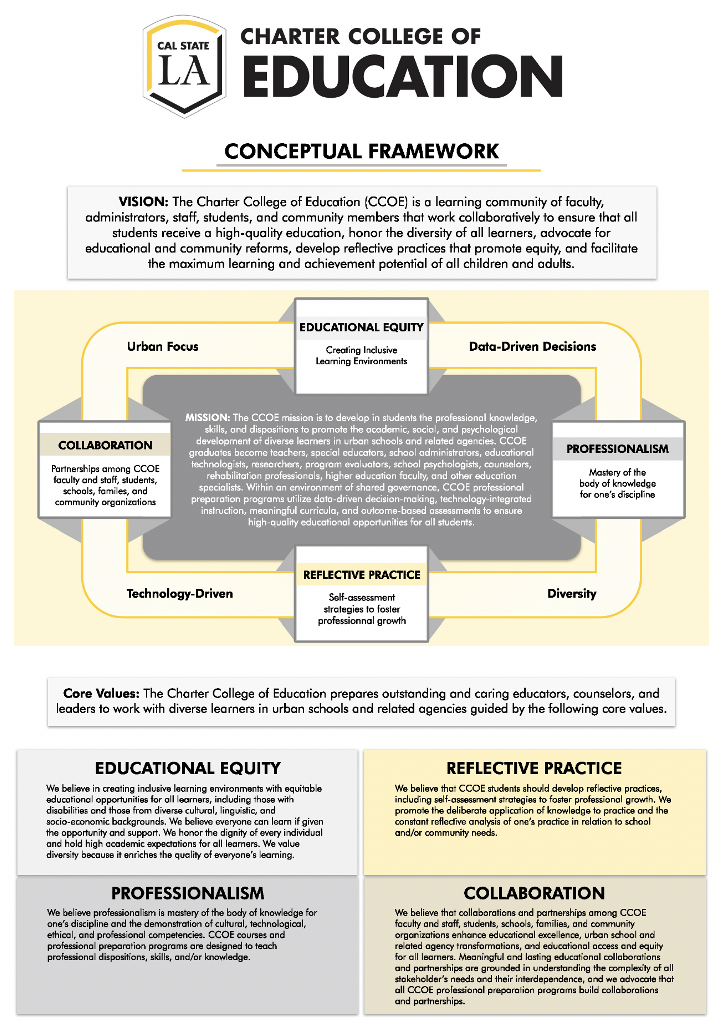Frequently Asked Questions
What are you looking for in a candidate for your program?
We are looking for candidates with a strong commitment to become a school psychologist, a willingness and readiness to study on a full-time basis, an appreciation for cultural and linguistic diversity, excellent communication skills (oral and written), a desire to work with children and adolescents - including youth with special needs, good interpersonal skills, and shared values with the Charter College of Education and Division of Special Education & Counseling.
I've already taken graduate courses at another university. Will I be able to transfer those courses?
Depending on the course content and year the course was taken, some graduate level courses may be transferred to your Cal State LA school psychology program plan. Generally, equivalent courses taken within 7 years of degree conferral (i.e., your anticipated graduation year) are eligible for transfer. We recommend meeting with the program coordinator or a program advisor. Bring your transcripts and course descriptions for the courses in question.
My undergraduate major is in an unrelated field. Do I still have a chance of being admitted to the program?
Absolutely. We do not have a major requirement and we welcome all majors to apply. Students who majored in an unrelated field who are successful in our program typically have at least some prior field experience in the helping profession (e.g., working or volunteering at a school setting or community youth agency, tutoring, ABA therapy).
Do you require the GRE or CBEST for admission?
No, we do not require the GRE or CBEST for admission. Students who are admitted and enrolled in our program are required to pass the CBEST by the end of their first year of the program.
On the CalStateApply application, I can't find the school psychology program on the list of available degrees. What should I select?
We offer the Master of Science in Counseling degree, with four different options within this degree (applied behavior analysis, rehabilitation counseling, school-based family counseling, and school psychology). The CalStateApply application will ask you which degree you are applying to, and the program application will ask you which option you are applying to. Therefore, on the CalStateApply application, you should select the M.S. in Counseling degree.
When are classes held and how often should I expect to be on campus?
Students have classes 2-3 days a week. All of our courses are scheduled in the early afternoon or evening (starting at 4:30 PM).
Can students work while they attend the program?
Many of our students work part- or full-time during their first year in the program. During the second year, most students only work part time due to practicum requirements, in which students complete 10-15 hours per week of field-based experiences in school settings. This requires students to be available at least 1-2 days a week for practicum. During the third year, students do not work and are encouraged to focus on completing their full time internship (40 hours per week).
I'm also interested in becoming a Board Certified Behavior Analyst (BCBA). Can I do that in this program?
The Division of Special Education and Counseling offers the Applied Behavior Analysis (ABA) certificate, which is designed to provide practitioners, such as school psychologists or school psychology trainees, the opportunity to develop specialized skills in applied behavior analysis. The ABA certificate also helps to prepare students for the National Certification Exam in Behavior Analysis. Individuals who are interested in becoming a BCBA may pursue the ABA certificate while they are in the school psychology program, complete supervised fieldwork experiences in ABA, and must pass the national certification exam. Approximately half of the students in our program pursue the ABA certificate. For more information, see: /academic/ccoe/programs/cert_aba
I want to become a school counselor, will your program prepare me for this?
No, our program does not prepare candidates to become school counselors. If you are interested in becoming a school counselor, please refer to the School-Based Family Counseling program: /academic/ccoe/programs/ms_mftpps
What is the College of Education's Conceptual Framework?
